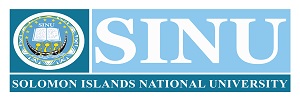Agriculture
Graduates of agriculture courses can take up jobs in the agricultural industry which include production of livestock, poultry, and crops. They may gain employment supervising, doing research, managing quarantine, or being agriculture field officers. Jobs in this sector can be found in the Ministry of Agriculture and Livestock (MAL) and other related Ministries, private companies, NGOs and communities. All courses provide a foundation for graduates who want to get higher qualifications in the field of agriculture. Graduates of the new Bachelor’s in Agriculture will be qualified to start graduate work for Masters and PhDs.
Forestry
Graduates of the Certificate and Diploma in Forestry will find positions in management and maintenance of forest plantations with planation companies operating in Solomon Islands. They may work as forest surveyors, safety and health officers in the workplace, or forestry rangers. Forestry graduates will be able to provide technical advice, support & training to landowners about timber maintenance and establishment. They may work to identify timber defects and grade timber for commercial purposes, establish and manage forest nursery and be involved in restoration and conservation projects. They can also become a forest botanist (identifying the local and exotic species by their local, common and scientific names) for research or management purposes. Graduates may seek jobs as officers within the Ministry of Forestry and Research, NGOs and private companies.
Environmental Studies
Graduates in environmental studies may undertake jobs that environment officers are required to do, such as, environmental impact assessment (EIA), resource and environment planning, pollution control and waste management officers, resource management and planning officers, quality control and assessment officers, work place health and safety officers, land use planning officers, teaching service cadre, or as private consultants. These technical skills are required in many natural resource and other sectors: e.g. forestry, agriculture, fisheries, mines, energy, health, lands and physical planning, education, civil aviation, transportation, water resources, infrastructure, food and beverages, shipping and others.
Fisheries
This Fisheries Studies program is developed to meet the growing need of the fisheries industry in the Solomon Islands. Following a Fisheries training needs assessment (TNA) conducted in 2012 /2013, The Solomon Islands National University (SINU) developed courses in fisheries studies to meet the needs identified in the various fisheries sub-sectors in the country. The TNA shows that fisheries being one of the major revenue earners of the country needs well educated fisheries professionals in senior positions in the industry to manage the many fisheries developments and issues faced such as managing fish stock at a sustainable level, creating policies and regulations at national and regional level, developing fisheries economic projects for communities and getting the maximum benefit for the county’s fish either for the man in the village putting fish on the table or for export. The program is exciting and presents career opportunities for many aspiring young people.
